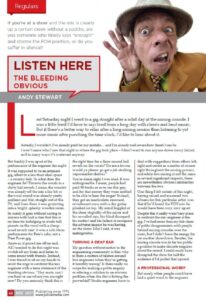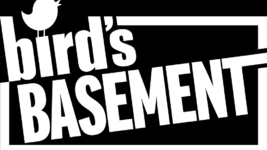News
15 Nov 2017
Listen Here – The Bleeding Obvious

Subscribe to CX E-News
REGULARS
If you’re at a show and the mix is clearly up a certain creek without a paddle, are you someone who finally says “enough!” and storms the FOH position, or do you suffer in silence?
Listen Here – The Bleeding Obvious
By Andy Stewart.
Last Saturday night I went to a gig straight after a solid day at the mixing console. I was a little fried I’d have to say; tired from a long day with clients and loud music. But if there’s a better way to relax after a long mixing session than listening to yet more music after punching the time-clock, I’d like to hear about it.
Actually, I wouldn’t. I’ve already paid for my mistake… and I’m already well aware how dumb I can be. I won’t name who I saw that night or where the gig took place – I don’t want to run anyone down (sorry Julius) and in many ways it’s irrelevant anyway.
But frankly I was upset at the performance of the engineer this night.
It was supposed to be an intimate gig, albeit in a less than ideal space – a country hall. So what does the engineer do? Drowns the vocals in a shitty hall reverb. I mean, the vocalist was already off the mic a fair bit so the vocal sound was already pretty ambient and thin straight out of the PA, and from there it was projecting into a bright, splashy, wooden room.
So surely it goes without saying to anyone with half a clue that this is no time for indulging in crude hall presets on the vocal with a cheap-arsed reverb unit. It was a solo blues performance for Pete’s sake, not a Fleet Foxes gig.
Anyway, it pissed me off no end. All I wanted to do this night was switch off my brain and listen to some music with friends. Instead, I was forced to sit on my hands to resist the urge to confront the mix engineer with a terse statement of the bleeding obvious: “Hey mate, can’t you hear or see where you are right now? Do you seriously think this is the right time for a three second hall reverb on the vocals? Do me a favour would ya please: go get a job stocking supermarket shelves.”
You’re damn right I was mad. It was unforgiveable. I mean, people had paid 90 bucks or so to see this guy, and for that money they were entitled to be able to hear the singer! Instead, they got an inarticulate, resonant, reverberant mess with a dry guitar plonked on top. My mind boggled at the sheer stupidity of the mixer and his so-called mix, his blind disregard for context and his failure to recognise the adverse impact he was having on the show. Like I said, it was unforgivable.
TURNING A DEAF EAR
My question without notice to the engineering community is this: why is there a culture of silence around live engineers when they’re getting it horribly wrong? Is there really no scope for making a polite enquiry or offering a solution to an obvious problem when the shit is hitting the proverbial? Studio engineers have to deal with suggestions from others left, right and centre as a matter of course right throughout the mixing process, and while live mixing is not the same in several significant respects, there are nevertheless obvious similarities between the two.
One thing I felt certain of this night, having mixed and mastered two albums for this particular artist, was that if he’d heard the FOH mix he would have been very, very upset.
Despite this it really wasn’t my place to confront the mix engineer at the gig. I’ve had more than my fair share of polite disagreements with people behind mixing consoles over the years, but I didn’t have the energy for yet another showdown. Besides, the mixing console was in far too public a position to make discrete enquires about the sound. I could easily have disrupted the show for half the audience if I’d pulled that ripcord.
A PROFESSIONAL WORD?
But surely other people could have had a quiet word to the engineer that night; like for instance the systems engineer. I know it’s not traditionally their role either to confront an act’s personal mixer mid show when things clearly aren’t right, but in this particular case it might have saved the gig.
Being a mix engineer himself and having just mixed the support act (as well as dozens of others in the venue), I was disappointed that he hadn’t felt the compulsion to politely suggest that maybe the reverb could be backed off a tad on the vocals – the hall is notorious and he knows this better than anyone.
I chatted to him after the show about it actually – we’re acquaintances so I wanted to say g’day anyway
– and politely shared with him my frustrations, only to discover that he’d had similar misgivings about the mix. I stopped short of asking him why, if he’d thought it sounded so bad he hadn’t done something about it. But again I didn’t feel like it was the right time or place for such a conversation. He was packing up in earnest at the time.
Anyway, as I drove home from the gig, I couldn’t get the night’s technical problems out of my head. It made me realise how different, in one specific regard, a live mix can be from its studio equivalent.
In a studio situation you’re often surrounded by songwriters, band members, and other producers and engineers, all of whom are invested in the mix, and depending on the circumstances, typically make polite (and sometimes impolite) suggestions about how the mix should evolve or ultimately sound. Hours and sometimes days are spent debating tones, levels, effects and so on, to produce an outcome that hopefully everyone loves. It makes things harder and slower sure, but it always improves the outcome and that’s all I care about in the end.
Live, it’s the polar opposite. Not only are the band at the mercy of the mix engineer’s decision making process, there seems to be an almost unwritten rule that he or she is not to be disturbed once the show is up and running. There are plenty of reasons why this is fair enough too – the gig is live for starters so there’s often little time for a chat.
But it seems crazy that there be silence around an engineer, even from fellow mix engineers and systems techs who may be aware of a problem that needs resolving or a sound that needs addressing. The band certainly can’t tell what things sound like, yet it’s their arse on the line in the end. If they’re being made to look foolish surely someone in the crew is entitled to make a polite enquiry at the very least?
There are many reasons why a culture of silence has developed around live engineers when things go wrong. No-one wants punters coming up and shouting at you while you’re mixing, sure, and there’s often no time to debate the merits of one tone over another, or the level of an instrument that someone thinks could go up or down. In the end the buck stops with the engineer when time is of the essence.
But there’s got to be some sort of middle ground when things are so obviously skew-iff as they were the other night. A polite word from the systems tech, who already has a professional working relationship with the mix engineer, would surely be a good place to start. I know FOH engineers may not like it, but who’s gig is this, the engineer’s or the band on stage?
Andy Stewart owns and operates The Mill in the hills of Bass Coast in Victoria. He’s happy to respond to any pleas for recording or mixing help… contact him at: andy@themillstudio.com.au
 This article first appeared in the print edition of CX Magazine November 2017, pp.46-47.
This article first appeared in the print edition of CX Magazine November 2017, pp.46-47.
CX Magazine is Australia and New Zealand’s only publication dedicated to entertainment technology news and issues since 1991. Read all editions for free or search our archive for stories, people, tech-tips, products and production reviews www.cxnetwork.com.au
Subscribe
Published monthly since 1991, our famous AV industry magazine is free for download or pay for print. Subscribers also receive CX News, our free weekly email with the latest industry news and jobs.






